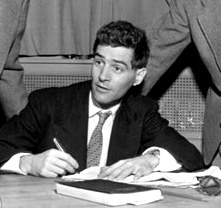Jean-Yves Bigras (1919-1966)
-

Jean-Yves Bigras signing a contract. To his right, Richard Jarvis, and to his left Richard Mingo-Sweeney.
Source : Cinémathèque québécoise, 2000.0179.PH.02
Jean-Yves Bigras entered the National Film Board in 1943. There he learned editing and direction, working in particular on the major series “Canada Carries On”. He also contributed to a medium-length film for children, The Boy Who Stopped Niagara (1947), through which he discovered fiction film, a style of filmmaking the NFB had little interest in.
He then moved to Renaissance Films Distribution to head up their educational film production. But this company did not survive for long. Next, he found himself working as assistant to René Delacroix on the action sequences of Le gros Bill (1949). This experience made him well placed to become the first Québécois to direct a feature-length fiction film, all the others having been made by immigrants. He thus directed the banal cabaret film Les Lumières de ma ville (1950). Despite this, J.A. DeSève reiterated his faith in him and allowed him to direct La petite Aurore l’enfant martyre (1951), which was a success with the public and an emblematic film in Quebec cinema of the day. When television arrived, Bigras began working for Radio-Canada, where he became one of its principal directors. Nevertheless, he didn’t entirely abandon the cinema, and had the “honour” of directing the last feature length film of the period, L’Esprit du mal (1954), a pitiful melodrama which had practically no resonance with either critics or audiences.
- Themes
- 16 mm
- Native Peoples in the Cinema
- The Talkies Arrive
- Television
- French Canadians at the NFB
- Censorship
- Religious Cinema
- Settling the Land
- Film and French language
- Cinema and Religion
- 16mm Exhibition Circuits
- Quebec’s French Cousins in its Cinema
- Colour
- Film Distributors and Exhibitors
- Hollywood in Quebec
- Maria Chapdelaine
- Quebecers in Hollywood
- Radio and Cinema
- The Massey Report
- Film Magazines
- Second World War
- Organisations
- Biographies
- Juliette Béliveau
- Jean-Yves Bigras
- Léo Choquette
- Fifi D'Orsay
- René Delacroix
- J.A. DeSève
- George Ganetakos
- Pauline Garon
- Gratien Gélinas
- Nicole Germain
- John Grierson
- Paul Gury
- Richard Jarvis
- Paul L'Anglais
- Louis-Roger Lafleur
- Herménégilde Lavoie
- Ovila Légaré
- Guy Mauffette
- Joseph Morin
- Fedor Ozep
- Jean Palardy
- Vincent Paquette
- Jean-Marie Poitevin
- Maurice Proulx
- Roger Racine
- Norma Shearer
- Gordon Sparling
- Albert Tessier